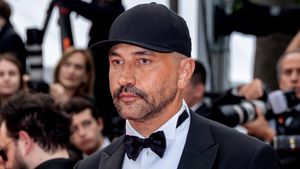
Treatment GuideJust DiagnosedSex & DatingAfrican AmericanStigmaAsk the HIV DocPrEP En EspañolNewsVoicesPrint IssueVideoOut 100
CONTACTCAREER OPPORTUNITIESADVERTISE WITH USPRIVACY POLICYPRIVACY PREFERENCESTERMS OF USELEGAL NOTICE
© 2025 Pride Publishing Inc.
All Rights reserved
All Rights reserved
Scroll To Top
By continuing to use our site, you agree to our Private Policy and Terms of Use.
'AIDS Vaccine Fails in Trials,' Los Angeles Times
'Vaccine for AIDS Fails Test Trial,' The Atlanta Journal-Constitution
'AIDS Vaccine Trial Deemed a Flop,' Chicago Tribune
'Big Setback for AIDS Vaccine,' The Boston Globe
'AIDS Vaccine Fails Test,'' San Jose Mercury News
'AIDS Vaccine Fails in Test,' Newsday
What's wrong with this picture? In February, VaxGen, a Brisbane, Calif.'based biotech firm, released data from its AIDSVAX trials. According to the company, black and Asian participants in the study responded differently to the vaccine than the whites and Latinos who participated. The trials were the first to test the effectiveness of an AIDS vaccine. They found that the vaccine did not work overall, but it was more than 75% effective in protecting black volunteers from infection with HIV.
San Francisco Chronicle columnist Tom Abate realized he had a failure to communicate when he received a flood of E-mails taking him to task for a headline that called the vaccine 'mostly a failure.' Some of his readers felt the headline suggested that only white people count.
A reporter for The [Cleveland] Plain Dealer echoed the sentiments of many African-Americans: 'The vaccine did work. It just didn't work on white people.'
'People are saying this trial failed because it didn't protect all the [white] people, as they hoped it would,' Michael Para, MD, a professor of medicine at Ohio State University and one of the independent researchers who reviewed the trial data, told the paper. 'But the company has found something worth pursuing.'
After preliminary discussions with the FDA, Abate reported, VaxGen's president, Donald Francis, MD, said, 'I think they want us to do additional field studies with African-Americans.' Francis has also said the company plans to seek FDA approval of the vaccine for African-Americans. Although the results released by VaxGen are very interesting, it is too early to make any firm conclusion about the ultimate impact of AIDSVAX on the AIDS pandemic.
But as Loretta Green, an African-American journalist with the
From our Sponsors
Most Popular
Lexi Love comes out as HIV+ after Trump deletes federal resources
January 23 2025 11:23 AM
Ricky Martin delivers showstopping performance for 2024 World AIDS Day
December 05 2024 12:08 PM
Trump's orders prompt CDC to erase HIV resources
January 31 2025 5:29 PM
California confirms first case of even more deadly mpox strain
November 18 2024 3:02 PM
This long-term HIV survivor says testosterone therapy helped save his life.
December 16 2024 8:00 PM
Plus: Featured Video
Latest Stories
HRC holds 'die-in' to protest Trump health care cuts
April 28 2025 2:11 PM
Two right-wing Supreme Court justices signal they may uphold access to PrEP and more
April 21 2025 4:10 PM
500,000 Children at Risk: PEPFAR Funding Crisis
April 08 2025 3:51 PM
Broadway's best raise over $1 million for LGBTQ+ and HIV causes
April 03 2025 7:15 PM
The Talk Season 5 premieres this spring with HIV guidance for the newly diagnosed
March 26 2025 1:00 PM
Discover the power of Wellness in your life
March 26 2025 12:41 PM
Season 4 of The Switch on resilience & radical self-love returns this spring
March 26 2025 12:20 PM
Jess King is here to help you live your happiest, healthiest life yet
March 24 2025 4:35 PM
BREAKING NEWS: Trump admin moves to end federal HIV prevention programs
March 18 2025 6:10 PM
Gerald Garth is keeping people of color happy and healthy through trying times
March 11 2025 3:38 PM
Celebrating Black History Month with our annual African American issue
February 01 2025 3:28 PM
Tyler TerMeer vows to continue to fight for health care for all
January 28 2025 3:00 PM
Plus nominated for 2025 GLAAD Media Award
January 22 2025 12:42 PM
A camp for HIV-positive kids is for sale. Here's why its founder is celebrating
January 02 2025 12:21 PM
'RuPaul's Drag Race' star Trinity K Bonet quietly comes out trans
December 15 2024 6:27 PM
AIDS Memorial Quilt displayed at White House for the first time
December 02 2024 1:21 PM
Decades of progress, uniting to fight HIV/AIDS
December 01 2024 12:30 PM
Hollywood must do better on HIV representation
December 01 2024 9:00 AM
Climate change is disrupting access to HIV treatment
November 25 2024 11:05 AM
Post-election blues? Some advice from mental health experts
November 08 2024 12:36 PM










































































